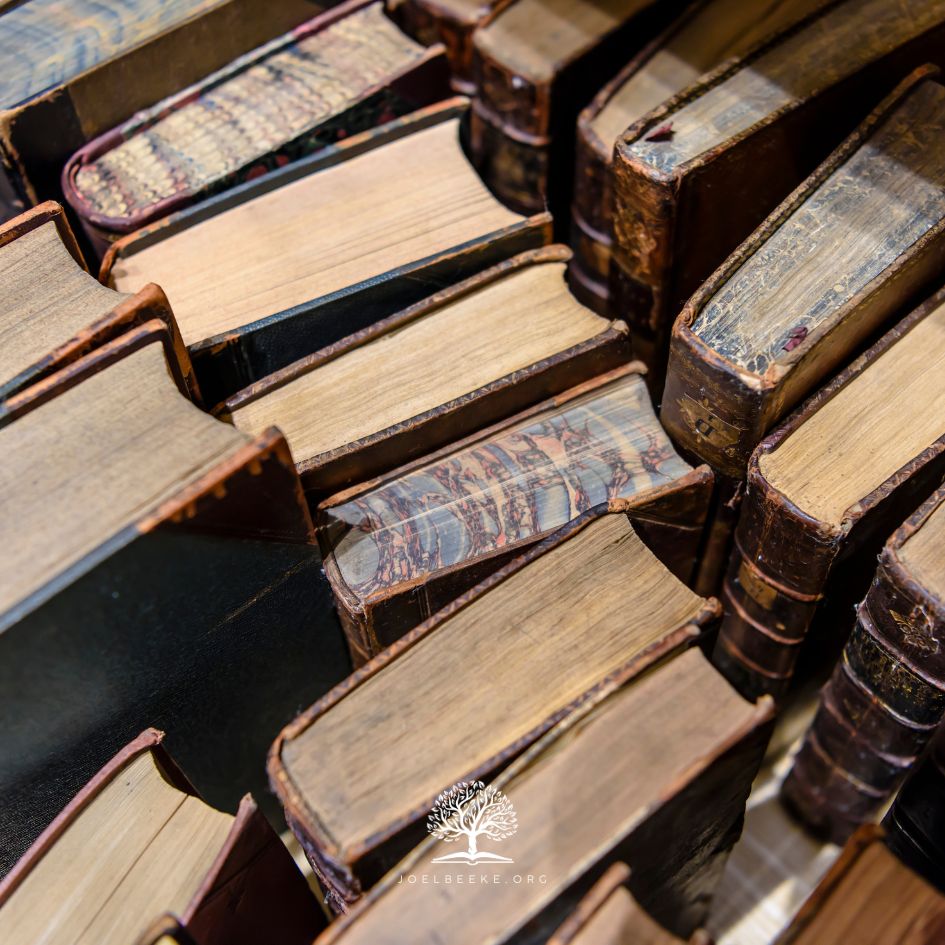
Anthony Burgess, “a pious, learned, and able scholar, a good disputant, a good tutor, an eminent preacher, a sound and orthodox divine” (Wallis, Sermons, p. 15), was born to the son of a schoolmaster at Watford, Hertfordshire. He entered St. John’s College, Cambridge, in 1623, and graduated with a Bachelor of Arts degree in 1627. He then transferred to Emmanuel College, where he was elected to a fellowship, and earned a Master of Arts degree in 1630. In the early 1630s, Burgess tutored John Wallis, the future Savillian professor of geometry, who, like Burgess, would become a member of the Westminster Assembly, and William Jenkyn, best known as the author of a thorough exposition of Jude.
Burgess served as vicar of Sutton Coldfield, Warwickshire, from 1635 to 1662, except for some years in the 1640s. During the Civil War, the king’s soldiers mercilessly persecuted Puritan ministers, ransacking their houses and evicting their families. Burgess fled to Coventry for safety from the king’s army, where he became one of the chaplains to the parliamentary garrisons and associated with several godly ministers, including Richard Baxter.
From Coventry, Burgess joined the Westminster Assembly of Divines, where he became known for his theological astuteness and piety. During his years in London, he preached to Parliament on at least six occasions; these sermons show a thoroughly biblical emphasis, an emphasis on maintaining church discipline, and an abhorrence of antinomian errors. In 1645, he replaced the expelled Thomas Crane as vicar of the Guildhall church of St. Lawrence Jewry, where he established a congregational presbytery. In 1647, he signed the Testimony of the London Presbyterian ministers against the toleration of heresy. Wherever he went, he was esteemed as an eminent preacher as well as a solid divine.
After the Westminster Assembly finished its work in 1649, Burgess returned to Sutton Coldfield. Noting his potential to be a university professor, Bishop Hacket of Lichfield supposedly begged Burgess to give up his nonconformist views. Hacket was familiar with Burgess through his writings, which thoroughly analyze each subject he addressed. During a fifteen-year span (1646-1661), Burgess wrote at least a dozen books, based mainly on his sermons and lectures. His writings reveal a scholarly acquaintance with Aristotle, Seneca, Augustine, Aquinas, Luther, and Calvin. He made a judicious use of Greek and Latin quotations, while he still reasoned in the plain style of Puritan preaching. In Burgess, cultured scholar and experimental preacher combined to produce astute, warm, devotional writing.
Several of Burgess’s major works have a strong polemic emphasis. His first major treatise, Vindiciae Legis (1646), based on twenty-nine lectures given at Lawrence Jewry, vindicated the Puritan view of the moral law and the covenants of works and grace in opposition to Roman Catholics, Arminians, Socinians, and especially, Antinomians. Two years later, Burgess wrote against the same opponents, plus Baxter, in his first volume on justification. He refuted Baxter’s work for its Arminian tendencies that promoted a process of justification involving the cooperation of divine grace and human works. His second volume on justification, which appeared six years later (1654), discusses the natural righteousness of God and the imputed righteousness of Christ. Those two volumes contain seventy-five sermons. His 555-page Doctrine of Original Sin (1659) drew the Anabaptists into the fray.
Burgess wrote as a faithful steward of the mysteries of God. In addition to being a formidable polemicist, he excelled as an experimental writer. He masterfully separated the precious from the vile in The Godly Man’s Choice, based on thirteen sermons on Psalm 4:6-8. His detailed exegesis in his 145-sermon work on John 17, his 300-page commentary on 1 Corinthians 3, and his 700-page commentary on 2 Corinthians 1 are heartwarming and heart-searching. They fulfill Burgess’s goal to “endeavour the true and sound Exposition…so as to reduce all Doctrinals and controversials to practicals and experimentals, which is the life and soul of all” (Burgess, Second Corinthians 1, intro.).
Burgess was ejected by the Uniformity Act of 1662. Resisting a desire to form a conventicle, he retired to Tamworth, Staffordshire, where he attended the parish church of his friend, Samuel Langley, a godly but conformist minister, until his death in 1664.
Burgess has been seriously underestimated in church history. He is one of only a few of the main Puritan authors who did not have a nineteenth century reprint of their works. Many of his books are worthy of being reprinted today.
Spiritual Refining: The Anatomy of True and False Conversion (IO; 2 vols., 1,100 pages; 1986-96). IO has recently done two 2-volume editions of Burgess’s Spiritual Refining (1652-54). The first edition, a facsimile, contains the complete unabridged text of 1658. The second edition of Spiritual Refining, an abridged edition, is worth the investment for those who have difficulty reading facsimile print, though choice sections have been removed.
Burgess’s magnum opus has been called an “unequaled anatomy of experimental religion.” The first volume, subtitled A Treatise of Grace and Assurance, contains 120 sermons; the second, subtitled A Treatise of Sin, with its Causes, Differences, Mitigations and Aggravations, contains 42 sermons.
In the first section of the first volume, Burgess discusses assurance and refutes the antinomian error that internal marks of grace in a believer are no evidence of his justification. In our opinion, the first sixty pages of the facsimile edition is the best treatment on assurance in all Puritan literature. Here is one choice quotation in which Burgess shows the need to give priority to Christ and His promises rather than to the marks of grace in ascertaining one’s assurance:
We must take heed that we do not so gaze upon ourselves to find graces in our own hearts as thereby we forget those Acts of Faith, whereby we close with Christ immediately, and rely upon him only for our Justification…. The fear of this hath made some cry down totally the use of signs, to evidence our Justification. And the truth is, it cannot be denied but many of the children of God, while they are studying and examining, whether grace be in their souls, that upon the discovery thereof, they may have comfortable persuasions of their Justification, are very much neglective of those choice and principal Acts of Faith, whereby we have an acquiescency or recumbency upon Christ for our Acceptation with God. This is as if old Jacob should so rejoice in the Chariot Joseph sent, whereby he knew that he was alive, that he should not desire to see Joseph himself. Thus while thou art so full of joy, to perceive grace in thee, thou forgettest to joy in Christ himself, who is more excellent than all thy graces (1:41).
Sections two and three describe numerous signs of grace. The remaining nine sections of this volume discuss grace in terms of regeneration, the new creature, God’s workmanship, grace in the heart, washing or sanctifying grace, conversion or turning unto God, taking away the stony heart, God’s Spirit within us, and vocation or calling. Throughout, Burgess distinguished saving grace from its counterfeits.
In the second volume of Spiritual Refining, Burgess focuses on sin. He addresses the deceitfulness of the human heart, presumptuous and reigning sins, hypocrisy and formality in religion, the misguided conscience, and secret sins that often go unrecognized. Positively, he explains the tenderness of a gracious heart, showing “that a strict scrutiny into a man’s heart and ways, with a holy fear of sinning, doth consist with a Gospel-life of faith and joy in the Holy Ghost.” His goal, as stated on the title page, is to “unmask counterfeit Christians, terrify the ungodly, comfort and direct the doubting saint, humble man, [and] exalt the grace of God.”
Speaking of regeneration, Burgess writes: “If God work (this) in you, you will be astonished to see the difference between yourself now and once; all that you have heard, read, or preached, is nothing to that you feel; but how is it to be feared, that many have seen godliness but in the map only, they never had experience of the thing itself.”
Cotton Mather writes in his Student and Preacher: “Of A. Burgess, I may say, he has written for thee excellent things.”
Excerpt from
Meet the Puritans: With a Guide to Modern Reprints
Joel R. Beeke and Randall J. Pederson







